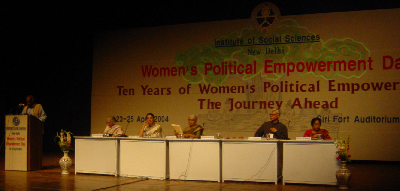|
A Women's Political empowermentSK Sharma The 73rd & 74th Constitution Amendments promulgated in 1993 are a landmark for two reasons, (1) local empowerment, and (2) women empowerment. Until 1993, panchayats and municipalities functioned virtually as subordinate offices of the state governments that controlled senior appointments, finances, planning and programmes, and could supersede them anytime for any flippant reason. These amendments not only gave constitutional status and fair amount of autonomy to them but also tried to empower women by providing them one-third reservation in election not only as councillors but also chairpersons. As a result, about one million women stand elected to panchayats. This legislation is indeed a landmark in the history of women’s movement. Institute of Social Sciences1 has since its inception in 1985 been intensively working to strengthen grassroots democracy through action research, awareness programmes and advocacy. Since 1994, it has been celebrating April 24 as Women’s Political Empowerment Day. Its principal objectives are create awareness about rights and responsibilities of elected women representatives, express solidarity, exchange experience among voluntary agencies, create awareness in the media about the issues, and evolve strategies for future. The ninth Women’s Political Empowerment Day Celebrations were held this year from April 23 to 25 in Siri Fort Auditorium in New Delhi. Over one thousand four hundred delegates participated. Elected women representatives from various states, academics, numerous voluntary agencies, human rights activists, delegates from the neighbouring countries, foreign dignitaries, parliamentarians and members of donor agencies participated in the three-day event. PACS, a DFID funded programme managed by the Development Alternatives and consortium of Pricewater House & Coopers, sponsored about 500 elected women representatives from six states to attend this convention. The celebrations comprised cultural activities, display of panchayat related literature and three-day deliberation. A fascinating film, “The Little Republic”, produced by Institute of Social Sciences can be ordered from it. Outstanding women panchayat leader were given awards in recognition of their work. Women & Law I was invited to address the session on Women & Law. Explaining the logic of democracy, I said that in democracy the sovereign people retain resources at the local level to handle all local matters such as administration of justice, police, education, healthcare, land, water system and forests. They devolve a fraction of their revenues to the state for higher level functions and coordination, but not to interfere in local matter. According to Hindu and Buddhist scriptures, the state can demand not more than one-sixth of local revenues for higher level functions and coordination. Symbolised in Ram Raj, the rule of the epic monarch Ram, Gandhi called it Gram Swaraj, that is village republics. Controlling five-sixth revenues, the local governments prosper, the one-sixth of the state shoots up, and it too becomes prosperous!
Most women sarpanchas understood the issue. They agreed to give their power of attorney in favour of People First to enable it to file PILs in superior courts contending that Right to Life guaranteed under Article 21 had been denied to the common people living in villages and urban slums, and praying that the Court may enforce the mandate of the 73rd and 74th constitutional amendments. The elected women sarpanchs understood the issues, much better than most educated elite who often suffer colonial mindset. They vied with each other in offering to sign the power of attorney in large numbers. People First is now in touch with leading advocates for handling the case in superior courts. The task is difficult. It truly is a second freedom struggle. It can succeed only through impassioned demand from the common people living in villages and urban slums led by their women leaders, and legal battle in superior courts. A simpler course is that the two major political parties should jointly vote for Gandhi’s Gram Swaraj in the parliament.
|